| Reviews & Columns |
|
Reviews DVD TV on DVD Blu-ray 4K UHD International DVDs In Theaters Reviews by Studio Video Games Features Collector Series DVDs Easter Egg Database Interviews DVD Talk Radio Feature Articles Columns Anime Talk DVD Savant Horror DVDs The M.O.D. Squad Art House HD Talk Silent DVD
|
DVD Talk Forum |
|
|
| Resources |
|
DVD Price Search Customer Service #'s RCE Info Links |
|
Columns
|
|
|
Boris Karloff Triple Feature: West of Shanghai, The Invisible Menace, Devil's Island (Warner Archive)
Three minor but entertaining Karloff programmers. Warner Bros.' fabulous Archive Collection, the super-secret vault of coveted, hard-to-find cult movie and TV classics, has released Boris Karloff Triple Feature: West of Shanghai, The Invisible Menace, and Devil's Island. Barely feature length (the longest runtime here is 64 minutes), the three Bs included in this set certainly won't top any list of Karloff's most interesting features (they probably won't even make the lists), but it's still fun to have these little-seen titles gathered together for the first time. An original trailer for West of Shanghai is included as a bonus to these okay transfers. Let's look very briefly at each title.
WEST OF SHANGHAI
The north of China, "rich in resources, difficult to police, and full of 'adventurers,'" such as self-made warlord General Wu Yen Fang (Boris Karloff), the "White Tiger of the North." As reports come in of Fang's marauding raiding parties on oil fields, International Oil Company field man Gordon Creed (Ricardo Cortez) makes plans to secure a potentially rich strike for his company. Wildcatter Jim Hallet (Gordon Oliver), financed by businessman Myron Galt (Douglas Wood), knows he's close to striking it rich, but a shortage of cash and Fang's army have brought him to the verge of foreclosure. Galt and his wise-cracking daughter, Lola (Sheila Bromley), are headed to Hallet's field, as well, to take possession, but Creed tells Galt he intends to give Hallet the needed payment...for a large slice of his fields. On the train bound for the fields, General Chow Fu-Shan (Valdimir Sokoloff) of the Nationalist Chinese Army, is assassinated. When the train is stopped, the Americans are held as suspects until the real murderer―one of Fang's men―is executed. Arriving at Dr. Abernathy's (Gordon Hart) mission, the travelers meet Creed's wife, Jane (Beverly Roberts), who has long been separated from Creed, and who now loves Hallet...although she will not divorce her husband. Cue Fang and his army arriving, and soon dangerous romantic complications arise (Fang wants Jane), and old friendships are put to the ultimate test (Hallet once saved Fang's life, before his rise to power).
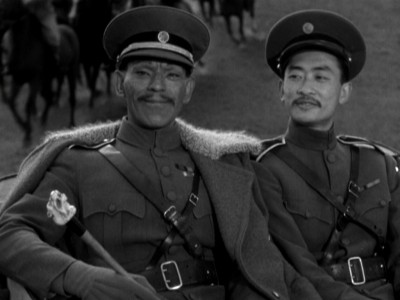
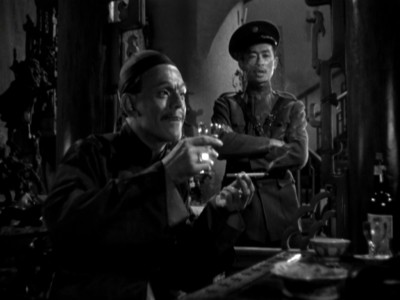
Transposed from Porter Emerson Browne's play, The Bad Man, which had been filmed twice before, the last time in 1930 with Walter Huston, West of Shanghai's locale was switched from Mexico to China. If this was done by Warners in an effort to capitalize on the recent headlines of Japan's incursions into future WWII ally China's homeland, it should be noted that West of Shanghai is not about the the Second Sino-Japanese War, as some reviewers have written. If anything, West of Shanghai resembles the Northern Expedition of 1926-1928, where the Chinese Nationalist Party of the early Republic of China attempted to unify the country by wiping out the savage warlords that ruled the Northern provinces. General Ma, played ironically by Japanese actor Tetsu Komai, is the Nationalist commander who arrives like the cavalry to save the Americans and destroy warlord Fang (someone must have had an eye towards coming world events, since both sides of the conflict here are essentially viewed favorably―because they're both not Japanese―while we get several statements praising the "efficient" Chinese government)
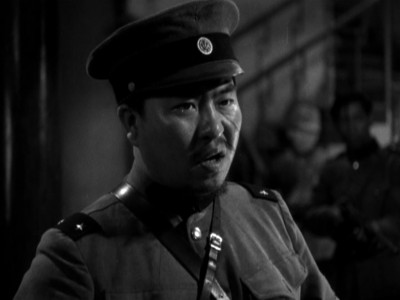
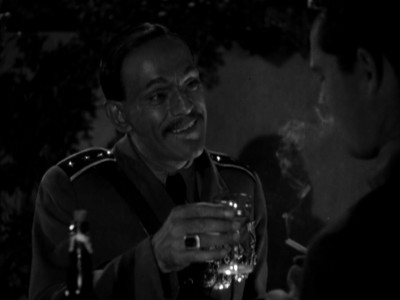
Like so many Bs, West of Shanghai borrows more than it invents, playing like part Agatha Christie train murder mystery, part The Bitter Tea of General Yen, and even a little bit of The Petrified Forest for good measure. Had West of Shanghai been shot over at Paramount, the glamour and exotic shimmer would have dominated, but here at Warners, emphasis is on snappy repartee and fast cutting. Certainly because of the Code, but also because freelancer Karloff couldn't pull off a romantic lead (no matter how much makeup he wore), West of Shanghai avoids re-creating General Yen's palpable atmosphere of forbidden, erotic miscegenation, relying instead on the stereotypical threat of rape for the beautiful white woman (Roberts) from the glowering "Oriental": Chester Gan's vicious Captain Kung Nui (to its credit, West of Shanghai presents assassin and Fang's right-hand man Richard Loo as a cultured, intelligent foe, contemptuous of Cortez's pigeon English, and fluent in several languages). Pro scripter Crane Wilbur (He Walked By Night, House of Wax) comes up with some funny dialogue exchanges ("What are they going to do with him?" asks Lola of Fu-Shan. A loud bang immediately follows, and Hallet deadpans, "They're going to bury him."), while director John Farrow (The Big Clock, His Kind of Woman, Hondo) keeps things moving at a fast clip. Still, even with this solid foundation, Karloff, not showing up until twenty minutes in (a significant detail for a 64 minute movie), pretty much saves the movie. Hiding behind fairly heavy makeup appliances like Muni or Chaney, Sr., Karloff can't manage a stereotypical Asian accent to save his life ("You no dang good!" he might say). However, after five minutes, you completely forget this fact once you see how deft he is with the line readings, bringing a light, insouciant tone to his character that is completely unexpected...and quite delightful. His Fang hardly seems murderous, and much more pixie-ish, toying good-naturedly with his captives, while incongruously offering himself up for sacrifice at the end. It's a charming portrayal, far better than this fun-but-thin, derivative B vehicle deserves.
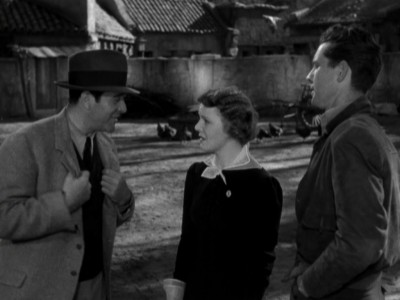
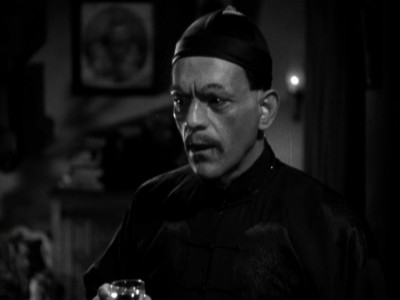
THE INVISIBLE MENACE
Just-married Private Eddie Pratt (Eddie Craven) smuggles his ditzy bride Sally (Marie Wilson) in a duffle bag and takes her back to base: super-secret Army installation Powder Island. Desperately trying to find a place to, um...talk things over, Eddie and Sally enter the Experimental Building and promptly discover ordinance expert Ted Reilly (Harland Tucker) gagged and tied to a chair, and tortured to death. A mysterious figure emerges from the shadows and clobbers Eddie, and both he and Sally hightail it out of there while sentries start running around with flashlights. Base commander Colonel George Hackett (Henry Kolker), suspicious of everyone, including Lieutenant Matthews (Regis Toomey), who would have normally led the murder investigation, calls up old friend Bob Rogers (Cy Kendall), a former Army Intelligence officer. Rogers flies to Powder Island...and is promptly shot at, before he begins to unravel the mystery. Who, exactly, is Superintendent of Construction Mr. Jevries (Boris Karloff), and what connection did he have with corpse Reilly? And what was Reilly doing with brand new Vickers machine guns, when his experiments were to be conducted with condemned ordinances? And most intriguingly, what does Haitian voodoo have to do with any of this fog-shrouded mystery?
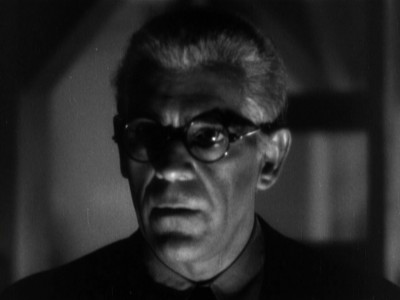
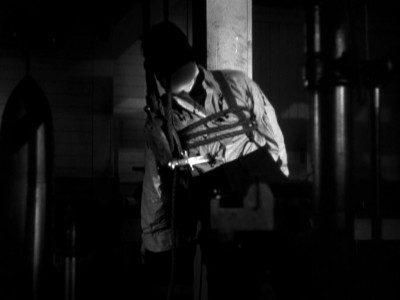
The weakest entry in the Boris Karloff Triple Feature, running just a scant 55 minutes, The Invisible Menace sounds like a cool Karloff sci-fi or horror vehicle you never heard about...until you see it and realize just exactly why you've never heard about it. Adapted all too obviously from the stage play by Ralph Spencer Zink (and remade in 1945), The Invisible Menace is an unsuccessful hybrid of military murder mystery and voodoo love triangle―unsuccessful in no small part because they blow off the more interesting voodoo love triangle element in a short flashback. Scripted and directed by Crane Wilbur and John Farrow (the same team from West of Shanghai), The Invisible Menace's murder mystery is engineered well-enough, even if it's stage-bound as hell, and its mystery element merely coincidental rather than ingenious (that dark, foggy production design helps a lot, though). However, the constant interruptions by Craven and particularly the supremely annoying Wilson (no funnier here than she will be in the Martin & Lewis My Friend Irma movies), bring the movie to a screeching halt over and over again, leaving less time for what should have been a major subplot: Karloff's past in Haiti. Told as a flashback in the center of the movie, we get a brief glimpse at The Letter-like hijinks going on between Karloff, his cheating wife (Phyllis Barry), and thieving Reilly, but we see none of Karloff's descent into alcoholism and cruelty towards his native charges (he was building a jungle road for the Army)―we only hear about these supposedly heinous outrages in a short court-martial trial exposition. What's the point of having Karloff in a movie where his character is a drunk and a torturer...and you don't show that? Who cares about Wilson's blathering and Craven's pathetic mugging alongside obviously embarrassed Frank Faylen as a tippling sentry? The studio thought that was more of a draw than Karloff maiming voodoo natives? Watchable, to be sure (Karloff does the best he can with what little he's given), but The Invisible Menace is completely forgettable.
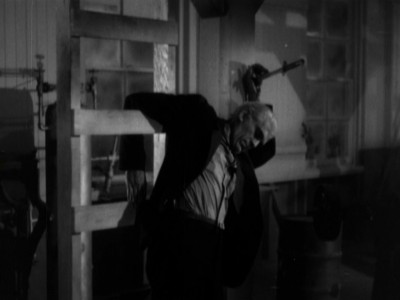
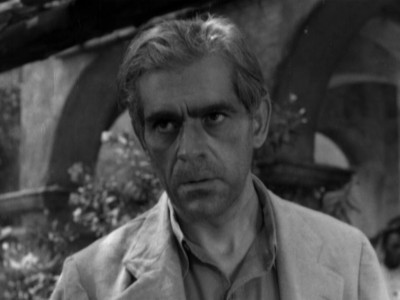
DEVIL'S ISLAND
Mentally ill Gustave LeBrun (Stuart Holmes) is sentenced to the notorious French penal colony, Devil's Island, after being falsely convicted of treason. Engineering an escape from his prison train, the wounded LeBrun goes to his friend's, Dr. Charles Gaudet (Boris Karloff), who had testified on LeBrun's behalf. The police break in during Gaudet's operation, and soon, Gaudet is convicted of aiding a prisoner...and of treason. Arriving on Devil's Island, Karloff gets the law laid down to him by silky commandant, Colonel Armand Lucien (James Stephenson): you're not a doctor anymore―just another prisoner. Armand's wife, Helene (Nedda Harrigan), is vaguely unsettled by her husband's casual readiness to inflict savage retribution against his prisoners, but the care of her young child, Collette (Rolla Gourvitch), is her main concern. After Gaudet learns the hard way that camp doctor Duval (Edward Keane) routinely ignores prisoner ailments to facilitate more available slave labor, Gaudet and his friends revolt after his deathly-ill friend Andre (John Harmon), is further abused by a guard. When Andre drops dead, his shovel spooks the horse of Helene's carriage, and little Collette is thrown, suffering a serious brain injury. Of course, Gaudet is asked to help, but once he does, the weaselly Armand double-crosses the doctor, and the stage is set for a final showdown between the corrupt prison commander and the wronged Gaudet.
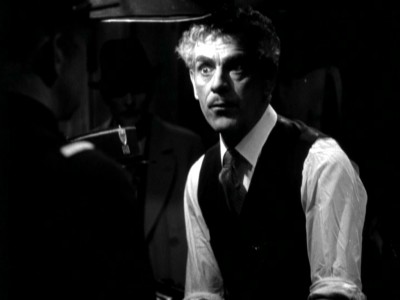
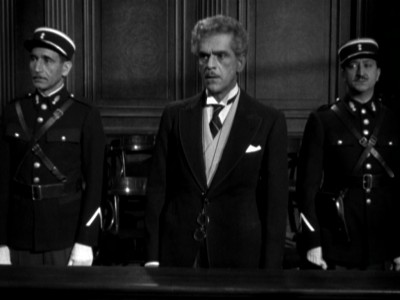
Originally planned as an "A" feature to capitalize on Warners' 1937 hit (set in part on Devil's Island), The Life of Emile Zola, skittish star George Raft predictably bailed on the project and Devil's Island was scaled back, with Karloff inserted to satisfy the final film of his Warner picture deal. Hoping to rush Devil's Island out in time to capitalize on the news that France would no longer send prisoners to the infamous penal colony, Warner Bros. apparently bowed to pressure from France to tone down the final cut of Devil's Island, further shortening―and weakening―the final product.
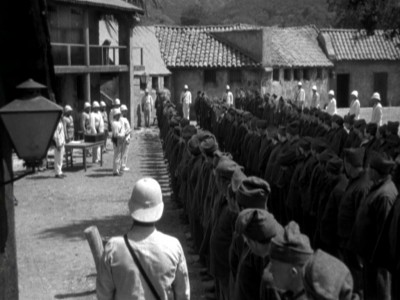
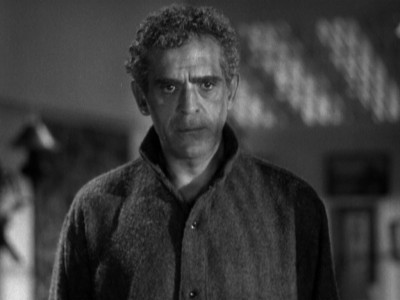
Playing now like a fairly standard variation of movies like The Prisoner of Shark Island, Escape from Devil's Island, and later entries like Strange Cargo and of course, Papillon, Devil's Island also channels Warners' earlier social protest movie, I Was a Fugitive From a Chain Gang, particularly in the few shots detailing the cruelty visited upon the prisoners (those shots of the prisoners getting their leg irons pulled could be a direct lift from the Le Roy picture). Devil's Island, however, mostly pulls its punches, both in condemning the politics involved (that title card absolving France of any wrongdoing pretty much sets the tone), and in showing anything truly graphic or disturbing. The evil of the Devil's Island in Devil's Island isn't inherent in the French penal system itself, but rather in the solitary corruption of one camp commandant (other officials express shock once they suddenly hear about horrendous conditions they had no idea about). Armand abuses prisoners not because that was France's policy, but out of venality: he needs more prisoners working to get his kickbacks. As for the torture, it's few and far between, and doesn't come close to what Warners showed in Fugitive/Chain Gang (hard to say what the original intention was here, since Devil's Island's more intense scenes were apparently trimmed under formal pressure from France―an unusual move on Warners' part that may have been hurried along by the U.S. government making it known they didn't want their inevitable future ally maligned before U.S. involvement in the war). Karloff, in a rare hero role, does well here, giving a commanding performance that suggests he was glad to have a chance to play a character with an actual arc (however slight) to his development and motivation. Scripted by Don Ryan and Kenneth Gamet, and directed by William Clemens (Clemens and Gamet did those terrifically entertaining Nancy Drew movies with Bonita Granville), Devil's Island, even with post-production alterations, is a model of B storytelling efficiency, with a bit of unexpected visual panache adding interest (Oscar-winning cinematographer George Barnes gives the movie an epic look, with fairly involved set-ups that you don't see in Bs like this). Fast-paced, familiar-but-grim, Devil's Island may not come off as deep or as meaningful as other better-known Warner protest films...but taken within its truncated, reduced context, it's just as entertaining.
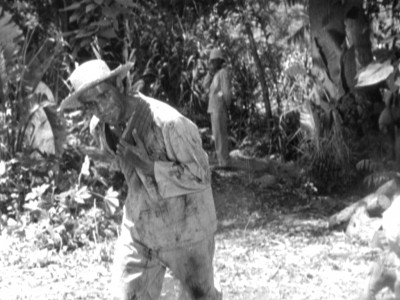
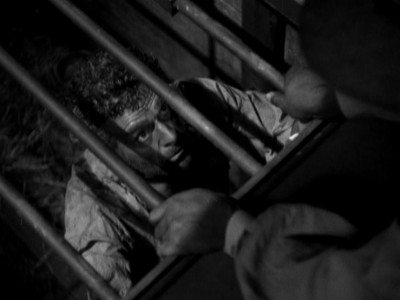
The DVD:
The Video:
The full-frame, 1.37:1 black and white transfers for all three movies are fairly consistent: medium-sharp images from unrestored elements, with quite a bit of scratches, some constrasty moments (Devil's Island went in and out more than the other two), and moderate grain. Average.
The Audio:
The English mono audio tracks are serviceable, with moderate hiss at times, but nothing distracting or unexpected, considering the original materials involved.
The Extras:
An original trailer for West of Shanghai is included.
Final Thoughts:
Certainly not the best Karloff had to offer in the 1930s...but still quite entertaining. The Invisible Menace is a miss, but West of Shanghai and Devil's Island are both good examples of speedy, punchy B moviemaking. I'm highly recommending Boris Karloff Triple Feature: West of Shanghai, The Invisible Menace, and Devil's Island.
Paul Mavis is an internationally published film and television historian, a member of the Online Film Critics Society, and the author of The Espionage Filmography.


|
| Popular Reviews |
| Sponsored Links |
|
|
| Sponsored Links |
|
|
| Release List | Reviews | Shop | Newsletter | Forum | DVD Giveaways | Blu-Ray | Advertise |
|
Copyright 2024 DVDTalk.com All Rights Reserved. Legal Info, Privacy Policy, Terms of Use,
Manage Preferences,
Your Privacy Choices | |||||||













